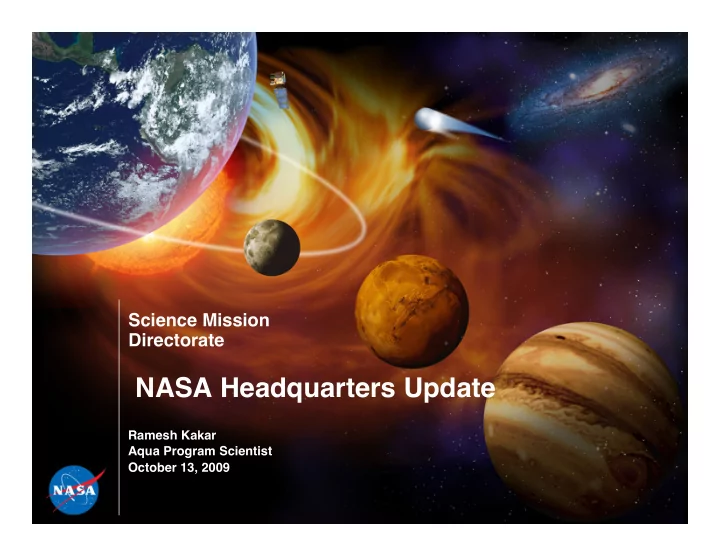

Science Mission Directorate NASA Headquarters Update Ramesh Kakar Aqua Program Scientist October 13, 2009
Current HQ Priorities Earth Science Operating Missions – Completed Senior Review Missions in Formulation and Development Decadal Survey Missions Weather Focus Area Priority: Hurricane Field Experiment
NASA Operating Research Missions 1st time in Senior Review New mission 3
Earth Science Missions in Formulation and Development NPOESS Preparatory Project 2 Required for continuity of several key climate Strategic mission - Systematic measurement measurements between EOS and NPOESS Required for continuity of long-term global land cover Landsat Data Continuity Mission change data; plan for post-LDCM acquisition Strategic mission - Systematic measurement operational agency in work Glory Addresses high priority objective of the US Climate Strategic mission - Initiate New Measurement Change Science Program and provide continuity for total solar irradiance and Continue Systematic Measurement Aquarius 1 First dedicated global measurement of sea surface Competed mission - Earth System Science salinity from space Pathfinder Global Precipitation Measurement 1 Extend spatial coverage to global and temporal Initializes a systematic measurement coverage to every 3 hours with constellation Soil Moisture Active / Passive Measurement of global, high-resolution soil moisture First Decadal Survey directed mission and its freeze/thaw state 1 Represents International Partnership 2 Represents Interagency Partnership 6
Decadal Survey Missions Next Generation Plus: Venture Class Freilich
GRIP: (Hurricane) Genesis and Rapid Intensification Processes Field Experiment • Global Hawk (UAV) (240 hours) Radar (Heymsfield/GSFC), Microwave Radiometers (Lambrigtsen/JPL), Dropsondes (NOAA), Electric Field (Blakeslee/ MSFC) Geosynchronous Orbit Simulation • DC-8 four engine jet (120 hours) Dual frequency precipitation radar (Durden/JPL) Dropsondes (Halverson/UMBC), Variety of microphysics probes (Heymsfield/NCAR) Lidars for 3-D Winds (Kavaya/ LaRC) and for high vertical resolution measurements of aerosols and water vapor (Ismail/ LaRC) In-situ measurements of Blue line: DC-8 range for 12-h flight, 6 h on station temperature, moisture and aerosols (Bui/ARC) Red lines: GH range for 30-h flight with 15 and 22.5 • Six to Eight week deployment h on station centered on September 1, 2010 Light blue X: Genesis locations for 1940-2006 RED= IIP, GREEN= IIP+AITT
Aqua Instrument Status • AIRS – Nominal Operations – All voltages, currents, and temperatures as expected • AMSU-A – Nominal Operations except for Channel 4 – All voltages, currents, and temperatures as expected – 03/05/08: GES DISC removed Channel 4 data from level 2 processing • AMSR-E - ADE Motor Current Torque Increasing – 07/17/07: Threshold changed to 4.5 Nm – 07/16/08: Meeting with JAXA Team on contingency response – 12/18/08: FOT set red-limit at 4.49 Nm – 01/07/09: Spike in ADA motor current and torque (worst observed to date) – 06/09/09: AETD Meeting – FOT/IOT closely monitoring performance – overall performance has been stable – 10/06/09: JAXA/ESMO/AETD Meeting • CERES-FM4 instrument shortwave anomaly – No impact to science data products • MODIS – Nominal Operations – Next MODIS Lunar Calibration #66 planned for 10/27/09 • HSB – OFF (Survival Mode) 9 ESMO PSR - September 2009 1/15/10
Spacecraft Anomalies 08/03/09 Solar Panel #8 Thermistor #6 Anomaly 10
Solar Panel #8 Thermistor #6 Anomaly • Aqua Solar Panel #8 Thermistor #6 Anomaly is similar to Aura Solar Panel # 8 Thermistor #5 Anomaly of January 2005. Aura anomaly was eventually attributed to the solar panel connector becoming partially disengaged and resulted in total loss of power from the panel. – Aqua has experienced no power loss to date • 08/11/09: GSFC/AETD (Denny Keys & Mitch Davis) assessment: – “Insufficient evidence to indicate that the Aqua anomaly is caused by a connector disengaging” (As in the Aura 2005 Anomaly) – “No operational modifications are recommended at this time” • The FOT has tested the necessary procedures to and is ready to disable the associated ARE and configure the circuitry to an open circuit condition similar to the EOS Aura configuration if necessary (GSFC/AETD & ART Recommendations) • 10/01/09: Thermistor #5 continues to provide valid data • It’s estimated that Aqua could lose 2 solar panels and still perform its science mission 11 ESMO PSR - September 2009 1/15/10
Fuel Usage: Actual & Predicted Ascent Maneuvers Fall 2004 Spring 2009 Fall 2006 Delta-i Delta-i Delta-i Maneuvers Maneuvers Maneuvers Annual Delta-i Maneuvers Spring 2017 Spring 2017 Delta-i Delta-i Spring 2007 Maneuv Maneuver ers s Delta-i Maneuvers 12 1/15/10 ESMO PSR - September 2009
Program Update AIRS/AMSU going strong – as far as I can tell cloud-cleared and new trace species retrievals are very useful Still need assurance regarding IASI performance and potential CrIS contribution to Climate data sets under cloudy conditions The “Senior Review” directed the Aqua project to implement its optimal proposal for extended mission operations in all areas except AIRS/AMSU is funded only during FY2010-2011 to develop AIRS greenhouse gas products CNES-JAXA-NASA A-Train Mission Scientist Workshop, 22-23 October, 2009, Paris, France “Science related to Aqua and Terra” to be competed via a ROSES 2010 NRA (separate NRA for NPP?) 13
Backup Slides
NASA Hurricane Field Experiments Field programs coordinated with NOAA/Hurricane Research Division 1998 2001 2005 2006 2010 (GRIP logo tbd) NASA GH NASA DC-8
Monitor real-time evolution of tropical cyclones Thermodynamic and convective structure Risk reduction for decadal-survey “PATH” mission New receiver technology HAMSR on Global Hawk New science/algorithms – 183 GHz receiver upgraded with LNA – Funded under AITT – Radar-like observations developed under ESTO/ACT – Ready for test flights fall 2009 – 3D structure of convection – Noise reduced by an order of magnitude – Ready for field deployment 2010 – Enables new investigations – Defines new state-of-the art 15 km 14 km 13 km 12 km 11 km 10 km 9 km 8 km 7 km 6 km 5 km 4 km Warm Core 3 km 2 km Noise reduced from 2 K to 0.2 K 3D reflectivity, Hurricane Emily (2005)
Recommend
More recommend